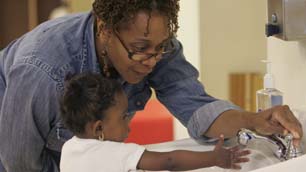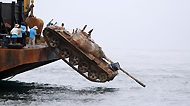HEALTH
Flu
Swine flu precautions go to school
Last Updated: Thursday, September 3, 2009 | 11:40 AM ET
CBC News
Parents should be prepared to pick up children early from school if they show a spiking fever in the fall and winter.
Students, parents and teachers shouldn't let the H1N1 pandemic virus worry them, but having students close together will lead to outbreaks, since children are amplifiers of flu in general, said Dr. Michael Gardam, director of infectious disease control with the Ontario Agency for Health Protection.
In spring 2009, some schools in New York City were overwhelmed by students sickened with swine flu.  School nurse Cindy Womack puts up signs encouraging students to take action against the spread of germs. (David J. Phillip/Associated Press)
School nurse Cindy Womack puts up signs encouraging students to take action against the spread of germs. (David J. Phillip/Associated Press)
Mary Pappas, the sole school nurse at Saint Francis Preparatory School in New York City, recalled the experience for a U.S. flu summit on Aug. 7. Pappas quickly realized she needed a system to deal with the 100 sick students lined up outside her office.
Pappas got a security guard to take temperatures and post the results on the students' shirts. Then she asked students to use their own cellphones to call their parents to pick them up.
Her advice for schools? Don't bother with oral thermometers that need covers and sterilizing; buy forehead strip thermometers instead.
The school's outbreak showed why it's so important to plan: collect parents' cellphone numbers and email addresses ahead of time to get the word out quickly when a student falls sick or a school is shut down.
Track absenteeism
Since then, health officials have learned that school closures don't work well for stopping the swine flu virus in its tracks. The virus has too strong a foothold in most communities in North America for that to help.
"If this was a disease that severely affected children and you had high rates of mortality or other things that said this is very different than a typical flu for children, then it's going to push you in the other direction, but we have not seen that," said Dr. David Butler-Jones, Canada's chief public health officer.
Schools could consider deferring classes if about 30 per cent of students and staff are off sick, in consultation with local public health officials.
Instead, the Public Health Agency of Canada (PHAC) suggested schools should stick to the basics like everyone else:
- Stay home when sick.
- Wash your hands often for at least 15 seconds with soap and water. Use hand sanitizer if you can't wash.
- Avoid touching your face.
- Sneeze and cough into your upper sleeve, not your hands.
- Keep cleaning supplies and dispensers well stocked.
- Wash surfaces like keyboards, doorknobs and toys twice a day.
- Isolate students who develop flu symptoms.
"H1N1 is definitely our prime focus" for caretakers, said Lori Nagy of the Edmonton Catholic School Board.
Stocking soap and towels
Some schools are preparing traditional posters or DVDs reminding students to lather up and scrub their hands.
For secondary schools, keeping soap and paper towel dispensers full might be a bit harder.
"Many schools now share a cleaning service between a number of schools, and they don't have somebody that's dedicated to their own facility," said Dr. Bonnie Henry, director of Public Health Emergency Management of the B.C. Centre for Disease Control.  Teachers like Sonia Deane may need to help young students wash their hands properly. (Mary Altaffer/Associated Press)
Teachers like Sonia Deane may need to help young students wash their hands properly. (Mary Altaffer/Associated Press)
In Toronto, cost and vandalism take their toll on the washrooms for 560 elementary and secondary schools.
"Kids being kids, I guess, there are some that are mischievous enough that they will empty the toilet roll or whatever. We put a lot of mechanisms and locks in place that try to defeat that, but they can be creative at times," said Chris Broadbent, manager of health and safety for the Toronto District School Board.
If the soap dispensers aren't topped up regularly, some teachers may offer hand sanitizer as an alternative when hands aren't visibly soiled. Parents may also pack bottles of hand sanitizer into backpacks for their sons and daughters.
Schools in the U.S. are also considering offering swine flu vaccines at school. The logistics still have to be worked out, just as for the rest of the population.
Since swine flu is riskier during pregnancy, two school boards in Quebec City are instructing pregnant teachers to stay home this fall to protect them.
There is a lot pregnant teachers can do to protect themselves, but not going to work isn't one of them, said Dr. Deborah Money, an obstetrician/gynecologist with the BC Women's Hospital.
"Women just need to be aware that they can have some control over that by being appropriately cautious, without literally hiding themselves away from the world," Money said.
The classroom is no different from the community at large, such as malls and public transit in terms of risk. Having a plan with a physician to quickly treat symptoms, and getting vaccinated once one is available are a pregnant woman's best protection, Money said.
Stay in dorm if sick
Meanwhile, colleges and universities where students may live in dormitories, attend large classes and socialize by hugging or kissing are taking up the public health advice to practise "social distancing" — avoid ill people and crowds if ill and stay in your dorm room until feeling well enough to attend class and participate in intramural and extramural activities.
Postsecondary schools should consider providing support for sick students living on or off campus, such as delivering meals to rooms, according to PHAC's guide.
Health officials are turning to Facebook and Twitter to reach young people who may feel invincible about the viral threat.
Post-secondary and boarding schools should also establish ways to monitor pandemic virus activity and report above normal expected absenteeism levels to local public health officials as required, PHAC said.
With files from The Canadian Press
